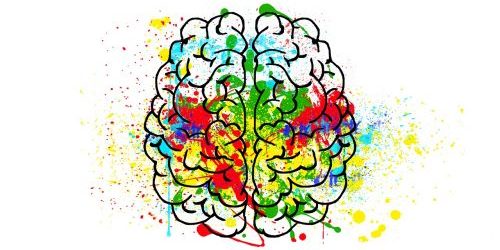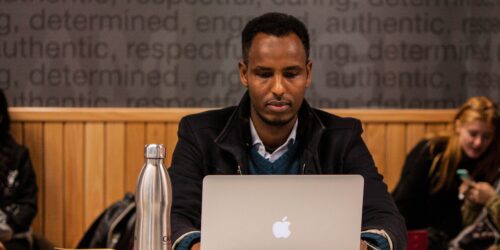Adult Learning Principles for College Teaching
How can we be sure our practices reflect the fact that all of our students are adult learners? Conestoga’s youngest students are 17 year-olds who finished high school in Ontario. However, the average student age is about 22 years old, with an increasing number of adult learners who are older and who have years of work experience, additional post-high school education, and busy personal and professional lives.
This tip describes the general ideas behind adult learning theory and offers ideas and further readings for ensuring the “adultness” of our students is front of mind as we teach.
Describing Adult Learners and Andragogy
There is no consensus about the age of an adult learner. The adult learner demographic often is characterized as those who are at an age in which they bring their own learning goals, life experiences, and self-regulation skills to the classroom.
Perhaps more useful than defining what constitutes an adult is understanding how an adult life’s situation differs from that of a child and the effects of those differences on learning. (Merriam & Bierema, 2014). In general, adult learners can have any of the following aspects:
- delayed entering college
- employed full time
- have a family or dependents
- looking to enhance professional lives or switching careers
- have years of knowledge and experience
- have an established system of values and beliefs
- are mature, independent, and motivated
- engage in informal learning activities
- expect to be treated as adults
These features that make up the adult learner profile have implications for teaching and learning. Malcolm Knowles (1980) popularized andragogy as an approach to helping adults learn by contrasting it with pedagogy, or the approach to helping children learn. According to Knowles, pedagogy is largely teacher-directed, while andragogy involves the teacher and the student in creating the learning path.
Knowles proposed several principles of adult learning, namely that adult learners:
- Initiate learning based on need,
- Move from dependent to self-directed learners,
- Draw on life experiences and seeks solutions to problems,
- Have a readiness and orientation towards learning, and
- Are internally rather than externally motivated.
In Knowles’ theory, learners benefit from solving real-life problems that draw on their own prior knowledge and interests. Adult learners want input on how they learn and understand the rationale behind what is being taught. Teachers should recognize that adult learners prioritize readiness and immediacy, and that they have a self-concept that they strive to maintain and uphold.
To review Knowles’ theory of andragogy, see “The modern practice of adult education: From Pedagogy to Andragogy” (2019).
Supporting Adult Learners
Organized around Knowles’ four pillars of of adult learning theory (New England Institute of Technology, N.d.), below are some ideas for supporting adult learning in the college classroom.
Adults want to give input in the planning and evaluation connected with their instruction
- Encourage students to consider their learning goals and how their goals connect with the course goals.
- Conduct a self-diagnostic of their skill levels to assess their needs for learning needs to achieve those goals.
- Give students the opportunity to choose one of multiple discussion or assignment topics.
- Ask students to find, review, and critique their own learning resources.
- Allow students to submit assignments in a mode of expression of their choosing.
- Give students semi-structured time in class and allow them to use it as they see fit.
- Provide learning opportunities in small, sequenced chunks
- Provide opportunities for scaffolded reflection and feedback
Personal experiences are the backdrop for learning activities
- Ask students to reflect on what they needed for learning in their younger years compared to what they need now.
- Provide an activity in which students reflect on their interests as they relate to the class topic.
- Give students opportunities to share what they know with you and with other students.
- Invite students to describe how they will apply their learning in their own lives.
- Ask students for feedback on their experiences in the course, and be prepared to adjust
Adults gravitate to learning things that are relevant to their jobs or lives
- Encourage students to investigate topics, organizations, and issues that are of importance to them.
- Provide ungraded prompts such as exit/entry slips that put students’ personal experiences into dialogue with the course content.
- Provide opportunities for students to share their capstone projects with industry experts, and receive feedback from those experts.
- Invite students to self-evaluate their own work and work habits.
- Give practical tips on how to improve their learning capacity and skill sets.
Adult learners focus their learning on problems, not subjects
- Ask students to solve real problems that the industry has faced or continue to face.
- Give students scenarios with problems and invite them to find a solution or resolution.
- Give students an opportunity to work together in a healthy competition.
- Provide activities that involve peer review.
- Invite students to reflect on what has made collaborative work successful for them in the past.
The main takeaway: adult learning theory encourages angling lessons to appeal directly to learners’ lives, to encourage learners to make personal connections with the course content and each other, to seek input from learners, and to treat learners with respect as adults.
To learn more about strategies for supporting adult learners, check out from Conestoga’s Library holdings, Adult learning basics 2nd ed (Rothwell, 2020) and Facilitating learning with the adult brain in mind : A conceptual and practical guide: 1st ed (Taylor & Marienau, 2016).
Beyond Principles of Adult Learning
Competing theories and decades of subsequent research have challenged aspects of Knowles’ theory of andragogy. Lack of empirical evidence suggests that instruments are required in order to provide measurable data to support andragogy (Taylor & Kroth, 2009).
Learner Differences
Merriam and Bierema (2014) explain that andragogy should be viewed as “a set of assumptions [that] distinguish adult learners from pre-adult learners” (xiii). Not every principle applies to every learner or in every learning context; for example, self-directed learning is not preferred or optimal for some learners (Brookfield, 1985), such as those with learning differences.
Classroom Contexts
Even the idea of distinguishing between adult and pre–adult learners may be culturally relative. Hanson (1996) has described that the concept of “adult learner” is based on individual differences and culture, context, and power within the classroom. What counts as relevant and meaningful knowledge and experience, and who decides what counts as mature and independent behaviours, are subjectively determined by who has power and agency in the classroom.
Cultural Differences
Principles of adult learning are still widely recognized and adopted to guide teaching practice in colleges today. Research on the brain and adult learning continues to provide suggestions for teaching strategies to support adult learners (Taylor & Marienau, 2016). It is also important to apply other relevant approaches to student learning, such as culturally responsive teaching, when supporting adult learners.
To learn more about culturally responsive teaching, see the article “Culturally Responsive Teaching With Adult Learners: A Review of the Literature” (Rhodes, 2018).
References
Brookfield, S. (1985). The continuing educator and self-directed learning in the community. In Brookfield (Ed.), New Directions for Continuing Education, (25), San Francisco: Jossey-Bass.
Hanson, A. (1996). The search for separate theories of adult learning: does anyone really need andragogy? In Edwards, R., Hanson, A., and Raggatt, P. (eds.) Boundaries of Adult Learning. Adult Learners, Education and Training, Vol. 1 (p. 107) London: Routledge
Knowles, M. (1980). The modern practice of adult education: Andragogy versus pedagogy. Rev. and updated ed. Englewood Cliffs, NJ: Cambridge Adult Education.
Merriam, S. B., & Bierema, L. L. (2014). Adult learning: Linking theory and practice. San Francisco, CA: Jossey-Bass.
New England Institute of Technology. (n.d.). The four principles of andragogy. https://www.neit.edu/blog/what-is-adult-learning-theory#The_Four_Principles_of_Andragogy
Rhodes. C.M. (2018). Culturally responsive teaching with adult learners: A review of the literature. Int. J. Adult Vocat. Educ. Technol. 9(4), 33–41. DOI:https://doi.org/10.4018/IJAVET.2018100103
Rothwell. W. (2020). Adult learning basics, 2nd Edition: Vol. 2ND EDITION. Association for Talent Development.
Rubenson, K. (2011). Adult learning and education. Saint Louis, Mo.: Academic Press. Retrieved from: http://site.ebrary.com/lib/oculryerson/docDetail.action?docID=10440525&p00
Taylor, B., & Kroth, M. (2009). Andragogy’s transition Into The future: Meta-analysis of andragogy and its search for a measurable instrument. Journal of Adult Education, 38(1), 1-11.
Taylor, K., & Marienau, C. (2016). Facilitating Learning with the adult brain in mind : A conceptual and practical guide: Vol. First edition. Jossey-Bass.



